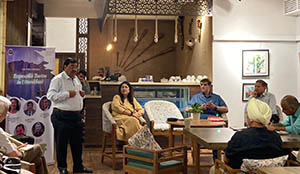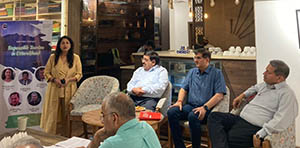DEHRADUN: Taking cognizance of “assault of mass tourism” mainly in the over-touristy Char Dham in fragile Himalayan region of Uttarakhand, experts cite example of Bhutan and other countries, advocating a “sustainable model of responsible tourism for Uttarakhand for survival of all stakeholders and its mountain culture and ecology”.
There are reports that as many as 80,000 tourists are visiting Char Dham every day in recent time. "This is nothing less than an assault on fragile ecology of this Himalayan region, stretching Char Dham capacity to limit".
It is against this assault on the Holy mountains that the dialogue on "sustainable and responsible tourism in Uttarakhand" has come as a "wake-up call for the proactive Pushkar Singh Dhami government" to put in place a model for the state.
The experts call for bringing tourist operators, tourists, NITI Aayog, Uttarakhand tourism, Bin and bags policy, diversification of tourism into new destinations on board to “save over-touristy Char Dham and other tourist towns from collapse”.
Expressing their concerns at the third edition of VoW Policy Dialogue was organized at VoW Cafe on Sahastradhara Road in Dehradun, experts from different fields zeroed in on the theme of the dialogue: Responsible Tourism in Uttarakhand.
The speakers involved in the policy dialogue emphasized the need for responsible tourism through various ideas and examples.
They also put spotlight on issues like carrying capacity, sustainable development educating tourists on local culture, environment, waste management and felt their concern over migration of hill people to the plains.
Leading the debate Dr. Sanjeev Chopra, director of the Valley of the Words Festival and former director of the IAS Academy said when we talk about tourism, we have to talk about our culture as well. “Tourism is a great medium for the promotion of culture”, he added. 
Through this we can take our traditions, our food and our products to other communities, Chopra said. “For this, all the stakeholders related to tourism will have to take responsibility and work on responsible tourism”, he asserted.
Citing the example of Bhutan and other countries, Chopra advocated different models of responsible tourism.
Kiran Bhatt Todaria, Managing Director, Indo Ganga Holidays and an avid promoter of adventure tourism in Uttarakhand spoke about the development of the rafting and tourism activities in Rishikesh during the last 30-35 years.
She said our state may have benefited economically through tourism, but for this we have put our environment and our culture at stake. 
Kiran Bhatt talked about making all the operators of the region sensitive towards environment and culture. The rafting activities should be started in other rivers of the state as well to promote adventure, she added.
Dr. Jagdeep Khanna, Principal, Institute of Hotel Management, Dehradun said there is a need to bring more clarity in the home stay policy in the state.
Along with promotion of culture and food through tourism, Khanna stressed the need to utilize the immense potential of tourism in Tehri Lake. “If we want to move towards responsible tourism, then we have to focus on carrying capacity, study and pre-planning”.
Hemant Kochar, Chair Uttarakhand Chapter of PHD Chamber of Commerce cited about 12 different models of tourism and advocated a need for further research within these models that suit the state like Uttarakhand.
Kochhar said we have to do research on what kind of tourists are coming to Uttarakhand, what they are giving us and what are they taking from here.
He said due to lack of control over the tourists, many tourists in the state tend to exhibit unruly behaviour. The state needs to diversify tourism developing new tourist places, Kochhar added.
He spoke about the need to implement the “bins and bags policy in all vehicles”.
There is a need to provide training to people associated with the tourism business in the state about sustainable tourism and Sustainable Development Goals, Kochhar said.
While conducting the program, Anoop Nautiyal of SDC Foundation gave information on different aspects of sustainable tourism in the report on Indian Himalayan Region released by NITI Aayog in the year 2018.
He referred to the Sustainable Tourism Criteria of the Union Ministry of Tourism, Eco-Tourism Policy of October 2021 of the Ministry of Environment and Uttarakhand Tourism Draft Policy 2020.
Through statistics, Nautiyal gave information about the responsible model of tourism on the basis of the number of pilgrims who came to the Chardham Yatra as well as the Purnagiri fair, Kainchidham fair and Ganga Dussehra fair that concludes this month.
Other who participated in the dialogue included HUDCO Regional Manager Sanjay Bhargava, Paramjit Singh Kakkar of Pramukh Sanstha, Vishal Kala of PHD Chamber of Commerce, Robin Nagar of Valley Culture, Shikha Prakash. The audience appreciated the policy dialogue and spoke about the need for organizing such programs from time to time.




